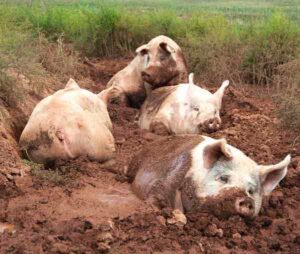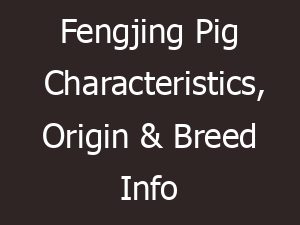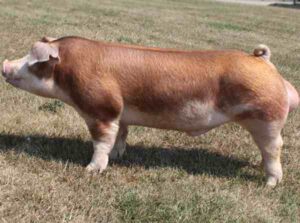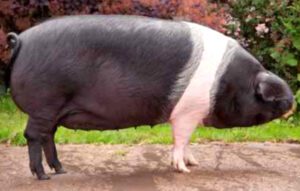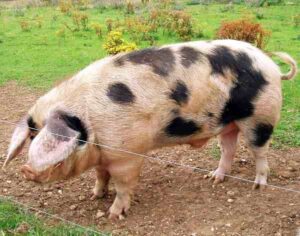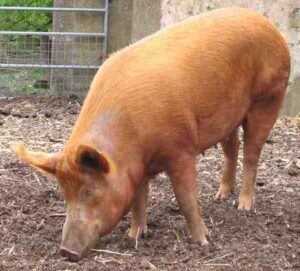The Welsh pig is a domestic breed of pig which is native to Wales. It is a large white breed that has been raised in Wales since time immemorial.
The breed is well known for it’s hardiness in extensive or outdoor pig farming system. The Welsh breed actually comes from various Welsh towns, especially from Mid Wales, Montgomery, Cardigan and also from Carmarthen and Pembroke.
The breed was once in the danger of extinction. It experienced a decline in numbers in the late 20th century. But the Rare Breeds Survival Trust was set up in 1973 for trying to prevent the extinction of many of the British traditional pig breeds.
Today the Welsh pig breed is not so widely kept as a pure breed, but it is used extensively in crossbreeding programs.
Total number of the registered breeding animals had dwindled by 2005, and the breed was declared ‘endangered‘, and later reclassified as a rare breed.
There were 108 registered males from 24 bloodlines, and 373 registered females in 2008. Their total numbers had grown by 2012, and total numbers of the registered males were 238 and 837 registered females.
The Welsh Pig Society became a member of the National Pig Breeders Association in 1952 (which is now known as the British Pig Association). Read some more information about the breed below.
Physical Characteristics of Welsh Pig
The Welsh pig is long sized animals and has pear-shaped body. It’s skin is thin and unwrinkled, and the coat is fine and straight. It is usually white in color, but occasionally has a few black spots.
It has a moderately wide head with straight nose and lopped ears (although the ears do not quite extend as far as the snout).
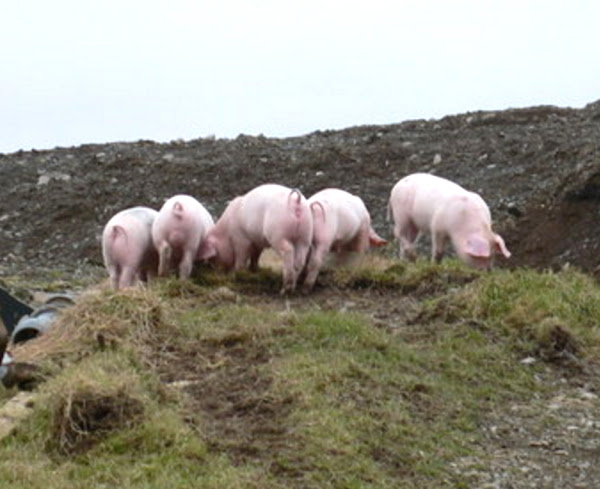
The Welsh pigs have moderately deep neck and their shoulders are flat at the top, supporting a long, strong and level back. Their forelegs are set widely apart and the rib cage is deep.
Both male and female Welsh pigs usually have at least twelve teats. The tail of the Welsh pig is thick and smooth at the root and it’s underline is straight.
It’s hind quarters are not flabby but are strong, with well rounded hams that are firm and thick. The loin of the Welsh pigs is well-muscled and the flank and belly are tick.
The mature boars on average weight about 250 kg. And average live body weight of the mature sows range from about 150 to 200 kg. Photo and info from Wikipedia.
Uses
The Welsh pig produces very high quality bacon and pork. It is breed commercially, and it provides a lean carcass with a high killing out percentage.
Special Notes
The Welsh pig is very hardy and it is well known for it’s hardiness in extensive farming system. Along with extensive system, the breed also can thrive well in indoors. It is very good for producing very high quality bacon and pork.
The breed retains sufficient fat cover for producing succulent, well flavored meat but is not excessively fat. Their meat grades well even when grown on to heavier weights.
Other advantages of the Welsh pig include a very good feed to meat conversion ratio. The sows have very good mothering abilities and the piglets have relatively a high survival rate.
For producing fast-growing, cross-bred progeny, the sows can be used in a breeding program with Large White or Landrace boars.
The Welsh boars can also be used on other rare breed sows for producing leaner and faster growing young with improved conformation. However, review full breed profile of the Welsh pig in the following chart.
| Breed Name | Welsh | |
| Other Name | None | |
| Special Notes | Well adapted to almost all climates, very hardy, fertile, excellent maternal abilities, thrive well in both indoors and outdoors, very high quality bacon and pork, grow relatively faster | |
| Breed Size | Medium | |
| Boars | Around 250 kg | |
| Sows | Vary from 150 to 200 kg | |
| Climate Tolerance | All climates | |
| Coat Color | Usually white, sometimes with a few black spots | |
| Rarity | Common | |
| Country/Place of Origin | Wales |

